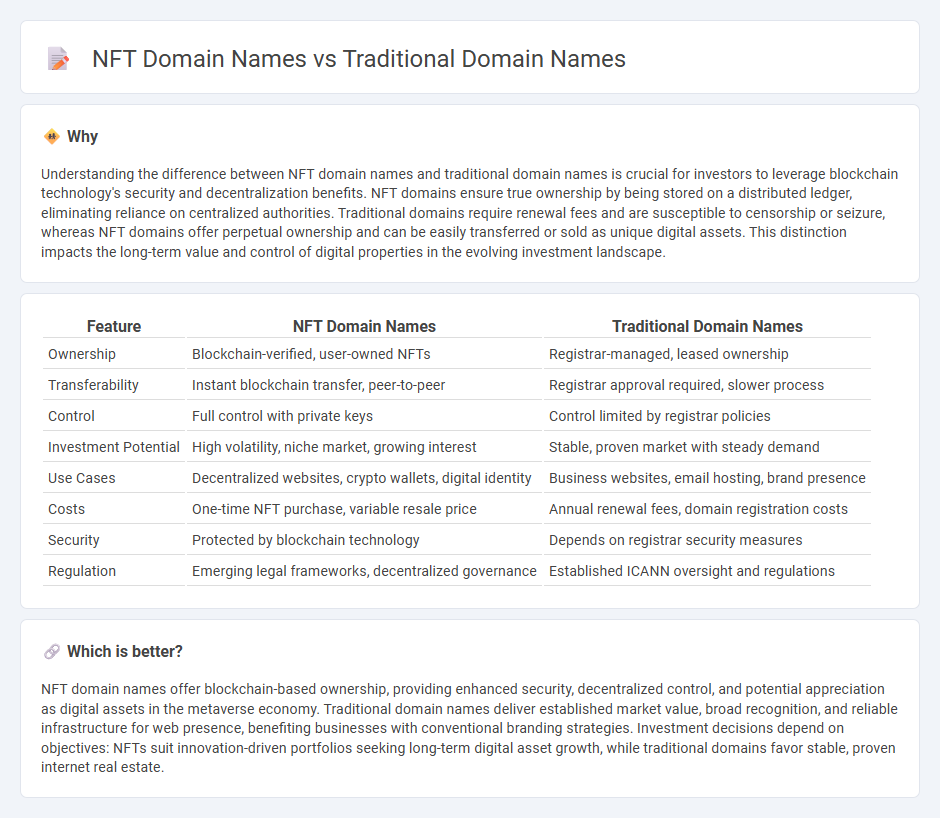
NFT domain names offer unique blockchain-based ownership, providing enhanced security, decentralization, and potential for value appreciation compared to traditional domain names, which rely on centralized registries and standard annual renewals. Unlike traditional domains, NFT domains can be traded as digital assets on various blockchain marketplaces, enabling investors to benefit from scarcity and unique branding opportunities. Explore the distinctions and investment potential of NFT domain names versus traditional domains to make informed decisions in the evolving digital landscape.
Why it is important
Understanding the difference between NFT domain names and traditional domain names is crucial for investors to leverage blockchain technology's security and decentralization benefits. NFT domains ensure true ownership by being stored on a distributed ledger, eliminating reliance on centralized authorities. Traditional domains require renewal fees and are susceptible to censorship or seizure, whereas NFT domains offer perpetual ownership and can be easily transferred or sold as unique digital assets. This distinction impacts the long-term value and control of digital properties in the evolving investment landscape.
Comparison Table
| Feature | NFT Domain Names | Traditional Domain Names |
|---|---|---|
| Ownership | Blockchain-verified, user-owned NFTs | Registrar-managed, leased ownership |
| Transferability | Instant blockchain transfer, peer-to-peer | Registrar approval required, slower process |
| Control | Full control with private keys | Control limited by registrar policies |
| Investment Potential | High volatility, niche market, growing interest | Stable, proven market with steady demand |
| Use Cases | Decentralized websites, crypto wallets, digital identity | Business websites, email hosting, brand presence |
| Costs | One-time NFT purchase, variable resale price | Annual renewal fees, domain registration costs |
| Security | Protected by blockchain technology | Depends on registrar security measures |
| Regulation | Emerging legal frameworks, decentralized governance | Established ICANN oversight and regulations |
Which is better?
NFT domain names offer blockchain-based ownership, providing enhanced security, decentralized control, and potential appreciation as digital assets in the metaverse economy. Traditional domain names deliver established market value, broad recognition, and reliable infrastructure for web presence, benefiting businesses with conventional branding strategies. Investment decisions depend on objectives: NFTs suit innovation-driven portfolios seeking long-term digital asset growth, while traditional domains favor stable, proven internet real estate.
Connection
NFT domain names leverage blockchain technology to provide ownership and transferability, similar to traditional domain names that serve as digital addresses on the internet. Both types of domains hold value as digital assets, with NFT domains offering enhanced security and decentralized control compared to traditional domains managed by centralized registrars. This connection creates new investment opportunities by combining the stability of conventional domain markets with the innovation of blockchain-based assets.
Key Terms
Ownership
Traditional domain names are typically leased from centralized registrars, meaning ownership is conditional and requires periodic renewal fees to maintain control. NFT domain names, registered on blockchain networks like Ethereum, provide true ownership through decentralized, immutable records, eliminating the risk of seizure or expiration. Explore how NFT domains revolutionize digital real estate ownership and enhance online identity security.
Liquidity
Traditional domain names operate within centralized systems, limiting liquidity as transfers require intermediaries and often involve lengthy processes. NFT domain names, built on blockchain technology, enable peer-to-peer transactions and instant ownership transfers, significantly enhancing liquidity and market accessibility. Explore how NFT domains revolutionize digital asset liquidity by learning more about their unique features and benefits.
Resale Marketplace
Traditional domain names are registered through centralized authorities such as ICANN, often involving annual renewal fees and limited ownership rights. NFT domain names leverage blockchain technology to provide decentralized ownership, enabling true digital asset control and seamless transferability on resale marketplaces without intermediaries. Explore the advantages and potential of NFT domain resale platforms to transform your digital presence.
Source and External Links
Domain name - Wikipedia - Traditional domain names are human-readable addresses like example.com that replaced numerical IP addresses on early networks, with history tracing back to ARPANET and the introduction of the Domain Name System (DNS) in 1983.
Types of Domain Names: A Helpful Guide - Traditional domain names consist of a second-level domain (e.g., example) and a top-level domain (TLD) such as .com, .org, or .net, which together form the core web address users type to visit a site.
The 10 Most Popular Domain Name Extensions (2025) - HostPapa - The most widely used traditional domain extension is .com, followed by .org and .net, with .com alone accounting for 44.4% of global websites in 2025.
 dowidth.com
dowidth.com